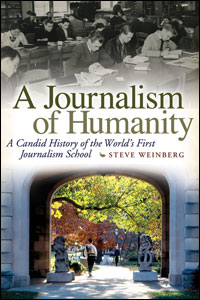New Book Offers Insider’s View of the World’s First School of Journalism
Columbia, Mo. (Feb. 21, 2008) — It is a little known fact that Walter Williams (1864-1935), the man who fought to establish the world’s first school of journalism at the University of Missouri and eventually served as its first dean, came close to turning the position down.
“It would not be financially advantageous,” Williams wrote to a friend while considering the position. “I am not a college graduate…The field is new and unorganized. The risk of failure is considerable and might be larger for me.”

But Williams did take the risk, and in doing so he revolutionized the concept of journalism throughout the world. Such stories and their significance to the profession of journalism are explored in A Journalism of Humanity: A Candid History of the World’s First Journalism School, a new book by Missouri School of Journalism Professor Steve Weinberg.
The book, written on the eve of the School’s centennial celebration, highlights 100 years of behind-the-scenes decisions, conflicts and turning points as leaders at the School carried on Williams’ precedent of improving the profession through innovation in training for journalism. Because of the School’s far-reaching impact, Weinberg said the book appeals to both insiders and observers of the journalism industry.
“Because almost everything we know about our world and our neighborhoods comes from journalists, whether we admit it or not, how journalists are educated matters to everybody inside and outside of the profession,” Weinberg said. “Walter Williams’ vision and way of implementing journalism education has spread to almost every journalism school in the world. Learning about how journalism education evolved at the Missouri School of Journalism matters to anyone who gets their news through the media.”
Weinberg, a 30-year veteran investigative reporter and alumnus of the School, stayed true to his journalistic roots in telling the School’s 100-year history by drawing upon internal documents, correspondence and personal interviews in the book’s 12 thematic chapters. In six years of researching and writing the book, Weinberg read hundreds of books and thousands of articles, in addition to perusing about 500,000 primary documents such as memos, letters and meeting minutes.
From the struggles over resources to the battle between the School’s scholarly and professional missions, Weinberg reports openly on the financial, social and human conflicts that have shaped the School since the days of Williams.
“The key players, the most significant programs, the critical junctures, the legal and ethical battles, all are here in an expert blending of past and present,” said reviewer Karen List, BJ ’70, journalism director at the University of Massachusetts–Amherst. “And Weinberg has enlivened the telling of this mammoth story with the kind of humanistic detail that brings it all alive and that will bring it all back to those who read it.”
Weinberg’s book is one of only a handful of books written specifically about the School. Sara Lockwood Williams, BJ ’13, MA ’31, documented the School’s early years in Twenty Years of Education for Journalism (1928), while Dean Emeritus Earl English reviewed the School’s 80-year history in his Journalism Education at the University of Missouri-Columbia (1988). Weinberg’s book is the first narrative history of the School.
“In the end, what is moving and memorable about A Journalism of Humanity is that it captures the full range of motivations from the grand to the petty that created what is a monumental contribution to American society in the 20th century,” said reviewer and author Walt Harrington, MA ’75, professor of journalism at the University of Illinois at Urbana-Champaign. “The University of Missouri School of Journalism has deeply influenced journalism education and the profession of journalism in this country and the world. Weinberg’s book is a gutsy portrayal that fits the values championed by the School and credibly establishes and documents the School’s claim to its historic and continuing stature.”
Weinberg is the author of seven books, including Trade Secrets of Washington Journalists (1981), Armand Hammer: The Untold Story (1989), Telling the Untold Story: How Investigative Reporters are Changing the Craft of Biography (1992), The Reporter’s Handbook: An Investigator’s Guide to Documents and Techniques (1996) and Taking on the Trust: The Epic Battle of Ida Tarbell and John D. Rockefeller (2008).
The 288-page book, published by the University of Missouri Press, includes 15 illustrations, a bibliography and index. Pre-sale orders can be made on the University of Missouri Press Web site or by phone at (800) 828-1894. Local bookstores will have copies to sell by March.
The book will also be available for purchase at the Sept. 10-12 joint centennial and dedication of the Donald W. Reynolds Journalism Institute, the think tank and research operation for journalism of the 21st century. Weinberg will be signing books at the celebration, which will feature dozens of sessions about the future of journalism, technology demonstrations, museum exhibits, tours and more.
Updated: April 22, 2020